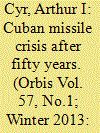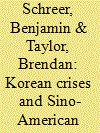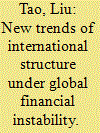|
|
|
Sort Order |
|
|
|
Items / Page
|
|
|
|
|
|
|
| Srl | Item |
| 1 |
ID:
118309


|
|
|
|
|
| Publication |
2013.
|
| Summary/Abstract |
The fiftieth anniversary of the October 1962 Cuban missile crisis is an appropriate time to review the events, which arguably were the closest the world has come to general nuclear war. The crisis was preceded by growing tensions between Moscow and Washington, and increasing Cuba emphasis in U.S. domestic politics. Analysts have differed on motives for trying to place long-range missiles in Cuba; Soviet officials consistently emphasized defense of Cuba. Revelations since the crisis indicate war was even closer than realized at the time. President John F. Kennedy deserves considerable credit for resisting military pressures.
The Cuban Missile Crisis of October 1962 arguably was the closest the world has come to nuclear war since the beginning of the nuclear era in 1945, and for that reason alone has been the focus of notable theatrical and literary products as well as scholarly analysis. The crisis has been described as President John F. Kennedy's "finest hour" in a touchingly brief tenure in the White House, and also as the direct result of weakness and miscalculation in the administration of that same American chief executive. Crisis management, a popular subject for analysis even before the crisis, received a major boost in visibility as a result of this unprecedented confrontation. The colorful personalities involved on both sides, including unpredictable Soviet Premier (Chairman of the Council of Ministers) Nikita Khrushchev, as well the photogenic and public relations-conscious U.S. leader, and some of their immediate advisers, have added to both human interest and dramatic potential. Finally, the crisis led to changes in strategic policies on the part of the United States and the Soviet Union, and their immediate allies. For these reasons and others, the half-century anniversary of the events merit a fresh look, both to review previous analyses and discuss lessons which bear on present-and future-international relations.1
The perceptions and conclusions among informed students of the Cuban Missile Crisis generally have shifted over the decades. At least in the United States, and among the international strategic studies community more generally, the initial reactions were generally laudatory of Kennedy and his men. Nuclear war had been avoided, while the goal of the removal of Soviet missiles from Cuba was achieved. Walt W. Rostow, a member of the Kennedy administration who later became national security adviser to President Lyndon B. Johnson, described the crisis as "the Gettysburg of the Cold War," a characteristic observation from this highly theoretical academic, but one which reflected wider sentiment. Later in the 1970s, as plots involving the U.S. government in efforts to assassinate Fidel Castro came to light, the Kennedy administration was regarded in a more critical light. During the same decade, information became public regarding JFK's reckless behavior in his personal life. That led at least some to analyze policies and politics of his administration with a much more critical perspective.2
|
|
|
|
|
|
|
|
|
|
|
|
|
|
|
|
| 2 |
ID:
102407


|
|
|
|
|
| Publication |
2011.
|
| Summary/Abstract |
For much of the past two decades, America's approach toward the Asia-Pacific has been seen by many as highly disjointed, the product either of strategic inattention or the push and pull of US domestic politics. Meanwhile, the rise of China has spawned a cottage industry asserting the existence of a carefully calibrated and highly calculated Chinese grand strategy for the Asian century. Rising China, according to this line, may be biding its time and hiding its capabilities, but it is ultimately bent upon displacing American power in Asia.
|
|
|
|
|
|
|
|
|
|
|
|
|
|
|
|
| 3 |
ID:
102994


|
|
|
|
|
|
|
|